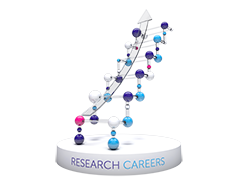Competency framework for fellowships
Our competency framework for fellowship applicants is intended as guidance for you to consider which funding opportunity is right for you to support your transition to the next career level.
How we are improving our Competency Framework for you

Our competency framework aims to support and nurture the most talented and dedicated researchers. We have received feedback from our fellows community that they need more support to translate their research and this aligns with our research strategy to 'accelerate the translation of research for patient benefit'. Therefore, from September 2020, our Competency Framework for Fellowships has been updated to reflect the skills and experience relevant to research translation. This will ensure translational efforts are being recognised and valued in our assessment processes.
We define a researcher engaged in the translation of research as ‘undertaking applied research and related activities that are based on fundamental scientific and clinical discoveries, and are intended to make a clinical impact on patients with cancer’. Not all researchers will translate their research, but for those who do, we are committed to recognise their relevant skills and experience. We appreciate that these will vary across different fields and types of research and therefore they might not all be relevant to you, personally.
Previously, in 2018, we introduced the competency framework and removed our time-bound eligibility criteria for our fellowships.
The framework covers three career stages and for each stage, clarifies the range of skills and experience that we expect you to demonstrate, which includes:
- Your current research experience and impact at the time of applying
- Your future research ambitions that we expect you to develop during the fellowship
- Your wider supporting and enabling skills at the time of applying, which will help you deliver on your research ambitions
The competencies outlined in the framework should be considered holistically. You might be able to demonstrate excellent skills/experience in several competencies, or some skills/experience across all competencies.
You will be assessed based on your body of work and its impact and influence in your field, and on your proposed research. The specific fellowship funding scheme guidelines outline the assessment criteria that the committees will use to make the final funding decision.
The updated translational skills and experience in in the framework will be included in our assessment processes to ensure translational efforts are being recognised and valued on par with other scientific outputs such as publications, which forms part of our implementation of DORA principles.
Develop independence |
Establish independence |
Transition to scientific leadership |
|---|---|---|
|
Developing your career in a specific field of research |
Ready to establish your own independent cancer research programme |
Further developing your programme and becoming an internationally recognised leader in your field |
|
AACR-Cancer Research UK Transatlantic Fellowship (currently paused) |
||
Current research experience and impactAt the time of applying you should have: |
||
|
|
|
|
*Research outputs may include but are not limited to preprints, training delivered, contribution to consortia, community outreach, patents, key datasets, software, novel assays and reagents and publications. We are a DORA signatory and therefore we consider the value and impact of all research outputs. |
||
Future research ambitionsDuring the course of the fellowship you should develop: |
||
|
|
|
Supporting and enabling skills |
||
Personal and scientific developmentAt the time of applying you should have: |
||
|
|
|
Personal leadershipAt the time of applying you should have: |
||
|
Started to develop leadership skills e.g. by organising workshops, supporting supervision of students/interns, being a member of clinical committees or working groups. |
Demonstrated leadership skills through e.g. providing supervision and career development support for PhD/MSc students and/or technical staff, leading clinical committees or working groups, coordinating clinical audits. |
Evidence of leadership skills through e.g. managing and providing career development support for your own research group, identifying talented postdocs and support acceleration of their independency, leading a clinical unit or clinical screening programme. |
Communication and engagement skillsAt the time of applying you should have: |
||
|
Demonstrated effective communication skills across different audiences through e.g. scientific meetings, PhD/postdoc forums, public science fairs, patient involvement (where appropriate). |
Evidence of communicating and sharing your own research outcomes effectively with the wider community through e.g. scientific meetings, (social) media engagement, patient involvement (where appropriate). |
A track record of communicating and sharing your own research outcomes effectively with the wider community through e.g. scientific conferences, (social) media engagement, patient involvement (where appropriate). |
Case studiesOur current fellows give practical advice on preparing for an application. |
||
|
Sean Lim, Advanced Clinician Scientist Fellow Charlie Massie, Career Development Fellow |
||
Printable document
If you need to save or print the Fellowships Competency Framework, download our printable version.
Career breaks (due to personal circumstances), part-time working and changes in discipline will be taken into consideration by our panels and committees to make appropriate adjustments when assessing your record of outputs, research achievements and career progression.
Before applying, you will need to assess your suitability for a particular career stage and fellowship funding scheme, and then discuss your application with your host institution. Specific ‘eligibility’ rules may also apply for individual fellowship funding schemes.
If you need further guidance, please contact your relevant Research Grants Manager (listed on each funding scheme) who can advise on your suitability for a particular fellowship scheme. When contacting us, please include:
- a short CV, including key research outputs
- 1 page (max) abstract of your proposed research
- a short description of why you’re applying for a particular fellowship and how you meet the expected skills and experience
More career development opportunities for researchers

We offer a range of fellowships, bursaries and other support to help outstanding scientists and clinicians develop their independent research careers.

